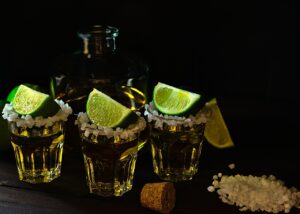Tequila is a distilled alcoholic beverage originating in Mexico, specifically in the region of Jalisco.
Mexican gastronomy, besides enjoying some of the most famous dishes in the world, is also characterised by its purely Mexican beverages.
It is produced from the fermentation and distillation of the juice extracted from the agave, mainly from the Agave tequilana species, known as blue agave. There are several types of tequila, classified according to their elaboration process and ageing time.
What does 100% agave tequila mean?
The term “100% Agave Tequila” is an important designation that appears on the label of some tequila bottles.
This indication means that the tequila has been made exclusively from agave juice, with no other sugars or additives added during the fermentation and distillation process.
Here are some key points:
- Pure raw material: when a tequila is labelled as “100% Agave”, it means that all of the sugar content used in fermentation comes from agave.

In contrast, some tequilas can have up to 49% of other non-agave sugars, such as sugar cane.
- Superior quality: 100% agave tequilas are generally considered to be of higher quality and purity compared to those that are not 100% agave. By using only agave in production, the characteristic flavour of this plant is highlighted.
- Origen Denomination: This designation is also linked to the Denominación de Origen del Tequila, which establishes the specific regions in Mexico where tequila can be produced. 100% agave tequila must meet specific standards set by the regulatory authorities.
- Categories: You can find 100% Agave tequilas in all categories, such as blanco (silver), reposado, añejo and extra añejo. This means that the purity of the agave is not limited to a specific type of tequila, but applies to the entire production process.
Types of tequila: blanco, reposado or añejo
White tequila

Tequila blanco, also known as silver tequila, cristal or joven, is a type of tequila characterised by its colourless colour and its fresh, pure taste. Here are some distinguishing characteristics of tequila blanco:
- Fermentation and distillation: Once the agave fruit is harvested and cooked, the juice is extracted, fermented and distilled. Tequila blanco is bottled directly after distillation, without ageing in oak barrels.
- Colour: Its main characteristic is its transparent colour, similar to water. Unlike other types of tequila that acquire colour during the ageing process in barrels, tequila blanco maintains the original clarity of the distillate.
- Flavour: Tequila blanco has a fresh, crisp taste, with more pronounced notes of agave. Its flavour profile tends to be more herbaceous and vibrant, as it has not been influenced by contact with the wood in the barrels.
- Versatility: Because of its clean, crisp taste, blanco tequila is a popular choice for cocktails and mixed drinks. It is commonly used in margaritas, palomas and other cocktails where the agave flavour can stand out.
- Quality: Look for the indication “100% Agave” on the label as a sign that tequila blanco has been produced using only agave juice, which is generally considered a superior quality standard.
Reposado Tequila
Reposado tequila is a type of tequila that has undergone a process of ageing in oak barrels, which gives it distinctive characteristics and flavours. Here are some key characteristics of reposado tequila:
- Ageing: Reposado tequila is aged in oak barrels for a period of time ranging from two months to one year. This process gives the tequila a slightly golden or pale yellow colour, which is acquired from the compounds present in the wood of the barrel.
- Colour: Unlike white tequila, reposado tequila has a darker tone due to the time it spends in contact with the wood. The colour may vary depending on the length of ageing and the type of barrel used.
- Flavour and aroma: During the ageing process, reposado tequila absorbs flavours and aromas from the wood in the barrel. This can result in notes of vanilla, caramel, fruits and spices, which add complexity and smoothness to the flavour profile.
- Smoothness: Compared to blanco tequila, reposado tends to be smoother, as the time in the barrel allows the flavours to blend and mellow.
- Quality: As with other types of tequila, it is recommended to look for the “100% Agave” designation on the label to ensure you get a higher quality tequila.
Aged Tequila

Añejo tequila is a type of tequila that has undergone a longer ageing process in oak barrels compared to reposado tequila. Here are some distinguishing characteristics of añejo tequila:
- Ageing: Añejo tequila is aged in oak barrels for a period of time ranging from one to three years. This extended time in the barrels allows the drink to acquire a greater complexity of flavours and aromas.
- Colour: Añejo tequila has a darker colour compared to reposado tequila, acquiring golden and amber tones. This colour is due to the interaction with the compounds present in the wood of the barrels.
- Flavour and aroma: During the ageing process, aged tequila absorbs flavours and aromas from the barrel wood. Notes of vanilla, caramel, dried fruits, spices and sometimes subtle hints of tobacco can emerge.
- Smoothness: Añejo tequila tends to be smoother than younger types, as the time in the barrel allows the flavours to integrate and the drink to achieve a more refined balance.
- Quality: As with other types of tequila, it is advisable to look for the designation “100% Agave” on the label to ensure that the drink is made exclusively from agave juice and meets higher quality standards.
At Taqueria de Birra we are experts in tacos and Mexican food since 1989, so if you want to taste some quality traditional tacos or the best tequila, we invite you to order to take away or come and try them at C/ Don Pedro, 11 or at Plaza de las Comendadoras, 2.



